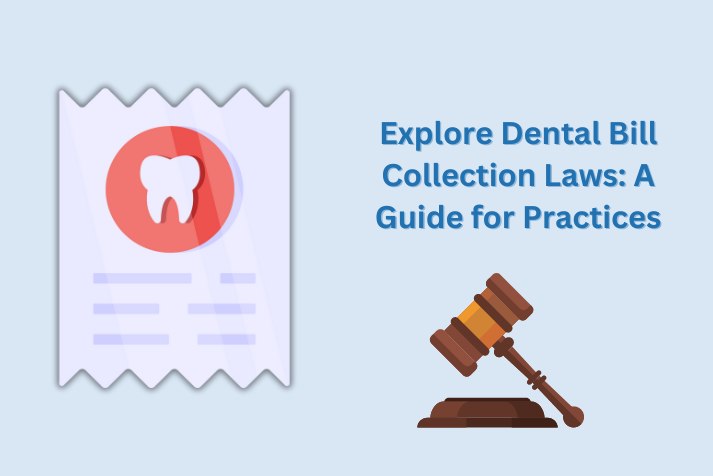Understanding dental bill collection laws is critical for both dental professionals and patients. These standards govern how practitioners manage billing and collection processes while ensuring that patients are treated fairly and ethically.
Importance in Dental Practices
Knowing dental bill collection regulations is critical not just for compliance, but also for maintaining a reputable firm. These rules safeguard practices from potential legal conflicts by requiring that their billing procedures comply with state and federal requirements. This information assists practitioners in implementing successful billing systems that encourage openness and patient confidence, which are critical for long-term success.
Importance to Patients
Understanding dental billing regulations is critical for patients seeking to protect their rights. Knowledge of these laws enables patients to negotiate their financial obligations more confidently and realize when their consumer rights are being respected or violated. This understanding promotes a more open and friendly relationship between patients and dental professionals.
A Dual Perspective Approach
This includes a dual perspective strategy to investigate dental bill collection laws:
- What Practices Should Need to Know: Detailed information on how practices can stay compliant with dental billing rules, including the complex nature of state-specific laws such as California dental billing laws.
- What patients should understand: A summary of patients’ rights under these laws, as well as practical advice on dealing with dental bills and collections.
Federal Laws Regarding Dental Billing
Federal rules, particularly the Fair Debt Collection Practices Act (FDCPA), play an important role in dental billing laws. This statute limits the ways that can be used to collect debts, including dental bills, and requires that practices do not utilize unfair or abusive approaches.
For example, the FDCPA restricts the use of threatening language or inconvenient timing in correspondence, so safeguarding patients from harassment. Awareness of these laws enables dental practices to maintain high levels of professionalism and patient care.
Federal Laws Vs Estate Specific Laws
Federal Laws
- Fair Debt Collection Practices Act (FDCPA)
This is the fundamental law governing debt-collecting strategies in the United States. It applies to personal, family, and household debts, including those incurred for dental treatments. The FDCPA forbids debt collectors from engaging in abusive, unfair, or misleading activities during the collection process, and it specifies consumers’ debt collection rights.
- The Health Insurance Portability and Accountability Act (HIPAA)
While HIPAA is primarily concerned with the privacy and security of health data, it also has an impact on dental bill collections, namely the sharing and use of patient information during the collection process.
Comparison of Federal and State-Specific Laws
| Feature | Federal Laws (e.g., FDCPA) | State-Specific Laws (e.g., California) |
| Scope of Application | Nationwide, all states | Applies only within the state |
| Protection Against Abuse | General prohibitions against abusive practices | May include specific prohibitions that are stricter than federal laws |
| Disclosure Requirements | Basic disclosures about debt and collector | May require additional disclosures, specific to the state |
| Enforcement | Enforced by the Federal Trade Commission (FTC) and other federal entities | Enforced by state agencies, may have different enforcement mechanisms |
| Penalties for Violation | Federal penalties apply uniformly | State penalties can vary, potentially more severe than federal |
State-Specific Regulations and Variations
General State Differences in Dental Billing Laws
Dental billing regulations in the United States can vary greatly by state, influencing how practitioners manage billing and collections. Each state has the right to implement regulations that supplement or even exceed federal standards, therefore dental clinics must be knowledgeable about the specific laws that apply in the jurisdictions where they operate.
A closer look at California’s dental billing laws
California is well-known for its strict consumer protection laws, and the California dental billing rules are no exception. These rules provide additional protections for California residents, making them distinctive in the context of dentistry practice. For example, California has strict regulations for billing openness and communication practices for collecting debts.
Comparison of General State Laws vs. California Dental Billing Laws
| Feature | General State Laws | California Dental Billing Laws |
| Statute of Limitations | Varies widely, typically 3-6 years | Specific to the type of debt, generally 4 years |
| Transparency Requirements | Basic itemization required | Detailed itemization and cost breakdowns are mandatory |
| Communication Protocols | Often follow federal guidelines | Stricter protocols, including specific times and methods for contact |
| Consumer Dispute Rights | General rights to dispute charges | Enhanced rights, including detailed dispute resolution processes |
Best Practices in Dental Billing Compliance
Effective Billing Strategies for Compliance
To comply with dental bill collection requirements, dental clinics must implement effective billing procedures that adhere to both federal and state rules. Here are key tips for ensuring compliance:
- Regular Training: Ensure that all billing professionals are regularly trained on modifications to dental billing rules, including federal and state-specific changes.
- Clear Billing Rules: Create clear billing rules that are upfront regarding costs, payment terms, and the process for managing billing complaints.
Audit and Review: Ensure Compliance through Regular Checks
Dental practices must conduct regular billing audits to ensure compliance with dental bill collection legislation. These audits serve to ensure that all aspects of the billing process comply with both federal and state requirements, protecting the practice from legal concerns. An effective audit should go over all billing papers and procedures to ensure correctness and completeness.
Educating patients on their rights and responsibilities.
Informing patients about their rights under dental billing rules is essential for building a transparent and trusted relationship. Educational strategies should include:
- Provision of Information: Providing extensive written explanations of patients’ rights and duties surrounding their dental expenses. This should be done at the point of service so that patients are aware from the beginning.
- Open communication channels: Practices should encourage patients to ask inquiries regarding their invoices and respond in a clear, intelligible manner. This open communication can help avoid misunderstandings and disagreements over billing concerns.
- Resource Availability: Making information available to help patients understand their rights under existing dental billing regulations. This could contain leaflets, website connections, or references to consumer protection organizations
Key Strategies for Audit and Patient Education
| Strategy | Description | Benefits |
| Regular Billing Audits | Routine checks of billing procedures for compliance with legal standards. | It prevents legal issues and improves patient trust. |
| Provision of Billing Information | Providing patients with clear, written billing policies. | Enhances transparency, and reduces disputes. |
| Open Communication | Encouraging questions and providing clear answers regarding billing practices. | Builds trust, and clarifies patient responsibilities. |
Common Challenges and Ways to Overcome Them
Typical Drawbacks in Dental Bill Collection
One of the most common issues that dental clinics face is effectively dealing with the complexity of dental bill collection laws. Common problems include:
- Misunderstanding of Legal Requirements: Practitioners may be unaware of both federal and state-specific requirements, resulting in non-compliant collection techniques.
- Inadequate Patient Communication: Poor communication about billing and collection rules might result in misunderstandings and disagreements with patients.
- Inconsistent Billing Practices: A lack of established billing methods can lead to errors and discrepancies, complicating the collection process.
To avoid these issues, practices should invest in thorough training on dental billing laws, establish clear and consistent billing protocols, and enhance communication with patients regarding their financial obligations.
Let’s Recap
This complete understanding and proactive management of dental billing rules not only ensure compliance but also promotes a good climate in which practices may grow and patients can feel comfortable in their interactions. The key to successfully handling dental billing is to stay informed and consult with professionals as needed.
FAQs
What are the dental bill collection laws?
Dental bill collection laws are regulations that govern how dental practices can legally pursue payment for services rendered. These laws include both federal standards, such as the Fair Debt Collection Practices Act (FDCPA), and state-specific regulations, which may vary.
Why is it important for dental practices to understand these laws?
Understanding these laws helps dental practices comply with legal requirements, avoid potential legal issues, and maintain ethical relationships with patients by ensuring fair and transparent billing and collection practices.
How can dental practices ensure compliance with dental billing laws?
Dental practices can ensure compliance by regularly training staff, conducting audits of billing practices, and maintaining open and transparent communication with patients regarding billing policies and their rights.




